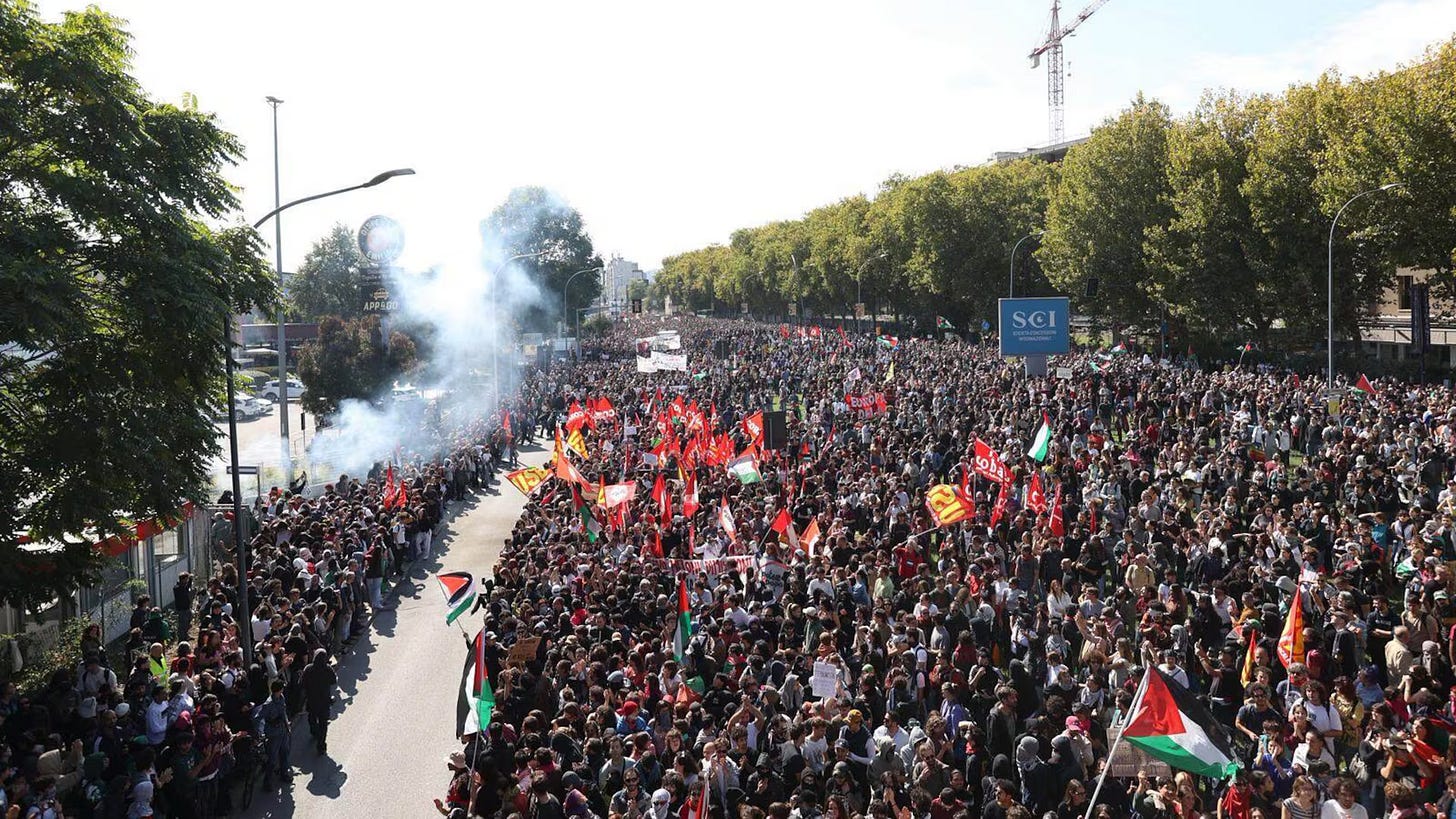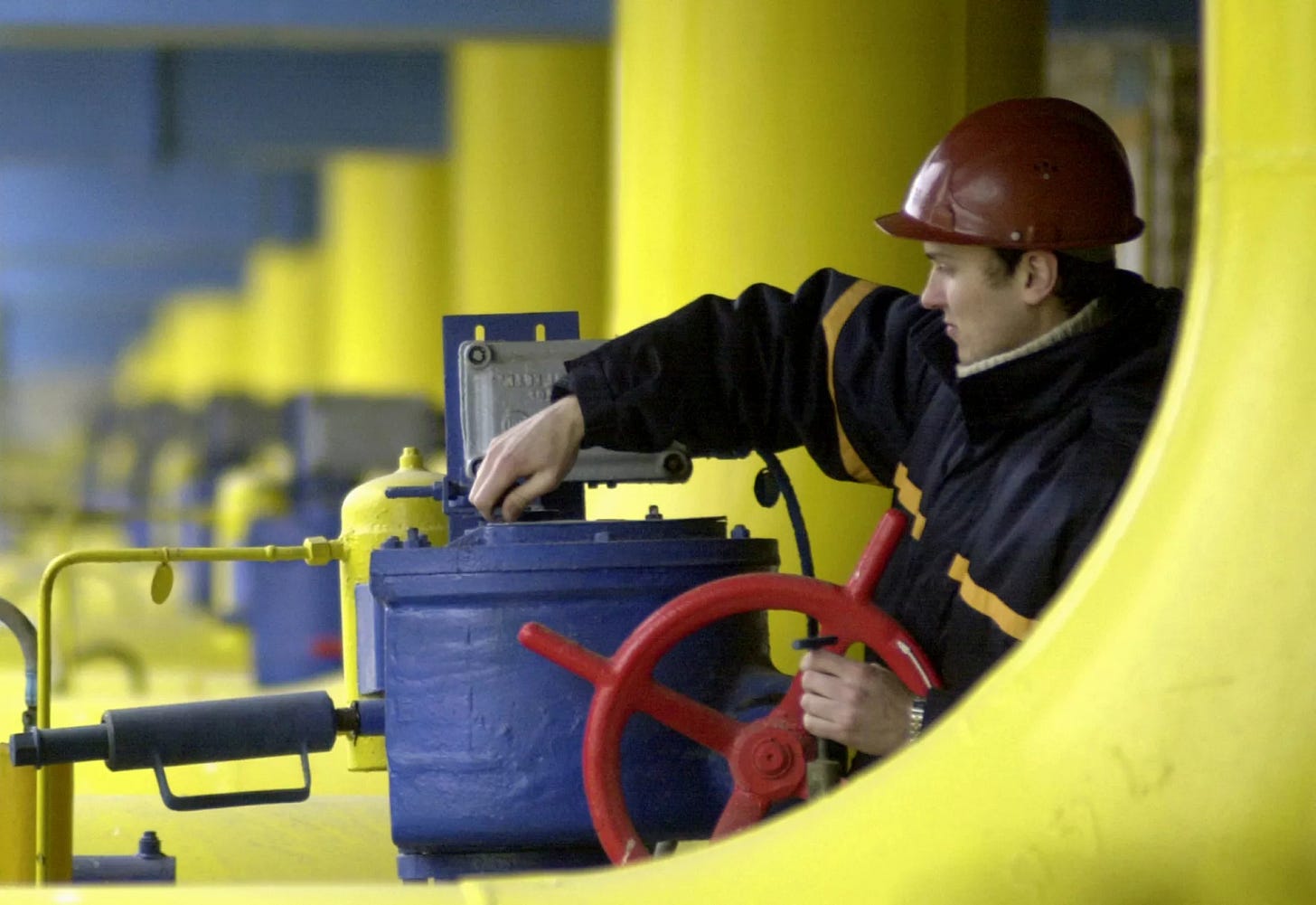⚡ Energy Wars: Ukraine Cripples Russian Refineries as Moscow Strikes at Ukraine’s Gas Lifeline
Kyiv’s drones cripple refineries across Russia’s vast, undefended skies—while Moscow unleashes its biggest barrage yet on Ukraine’s gas lifeline, weaponising winter with zero regard for civilians.
Ukraine has dramatically ramped up its drone war deep inside Russia, crippling more than half of the Kremlin’s major oil refineries and sparking fuel shortages not seen since the 1990s. A major disadvantage for Moscow is its sheer size, making it impossible to defend the skies across such vast territory—especially with military resources tied down on its western flank and along the long frontline with Ukraine. In a closed-door briefing on the sidelines of UNGA, I learned that Russia is so desperate for more air cover it has even asked Turkey to return its advanced S-400 missile defense systems (reportedly sitting idle).
In retaliation, Moscow has unleashed one of its largest strikes of the war—381 drones and 35 missiles—on Ukraine’s Naftogaz energy facilities, weaponising winter by depriving civilians of heat and light. The difference could not be clearer: unlike Ukraine, Russia operates with zero adherence to international humanitarian law, committing war crimes with impunity and little downside.
👉 If you find this analysis valuable, consider upgrading to a paid subscription to World Briefing Plus. Your support makes independent, on-the-ground reporting possible—and ensures these stories, often ignored elsewhere, continue to reach a global audience.
Ukraine has dramatically increased the number of attacks launched against Russian oil refineries in recent months, sparking fuel shortages and price rises in some parts of the country, BBC Verify and BBC Russian have found. Drone strikes on refineries - some deep inside Russia - soared in August and remained high in September, an analysis of Russian media reports and verified footage showed. Some 21 of the country’s 38 large refineries - where crude oil is converted into useable fuel like petrol and diesel - have been hit since January, with successful attacks already 48% higher than the whole of 2024. Owners of small and independent petrol stations in Siberia have told Russian media they have had to shut down due to ongoing issues with fuel supply. A manager in the Novosibirsk region compared the situation to the hyperinflation experienced by post-Soviet Russia. “In my opinion we haven’t had a crisis like this since 1993-1994,” he told local outlet Precedent TV. “Many petrol stations have now suspended their operations. Perhaps it is better to wait out the crisis than make a loss.’”
Ukrainian drone strikes targeted the Orsk oil refinery in Russia, located about 1,400 kilometres from the Ukrainian border, Andriy Kovalenko, head of the Centre for Countering Disinformation at the National Security and Defence Council of Ukraine, said Friday. A Ukrainian drone attack also briefly halted operations at the Azot chemical plant, one of Russia’s largest, in Berezniki, more than 1,500 kilometres east of Moscow, officials said.
Russia launched its biggest attack of the war overnight into Friday against natural gas facilities in Ukraine run by the state-owned Naftogaz Group, officials have said. Russia fired a total of 381 drones and 35 missiles in the attack, according to Ukraine’s air force, in what officials said was Moscow’s attempt to wreck the power grid ahead of winter and wear down the Ukrainian population in its all-out war, now well into its fourth year. “This is deliberate terror against civilian facilities that provide gas extraction and processing for the normal life of people,” Serhii Koretskyi, chief executive of Naftogaz, said in a statement. “It has no military purpose. This is yet another act of Russian malice aimed solely at ... depriving Ukrainians of warmth in winter.” Russia aimed 35 missiles, many of them ballistic, and 60 drones at Naftogaz’s gas extraction and processing facilities in the northeastern Kharkiv and central Poltava regions, some of which sustained critical damage, Koretskyi said. Russia’s Ministry of Defence said “all designated targets were hit” after its forces launched a mass strike using drones and guided weapons against Ukraine. As winter has approached each year since the 2022 full-scale invasion of its neighbour, Russian forces have blasted Ukraine’s power grid and other critical energy infrastructure. Kyiv says it is an attempt to weaponise winter by denying civilians heat, light and running water. In Poltava, the attacks injured an eight-year-old child and two women, according to regional authorities. One blast also shattered about half of the windows in the city’s historic St Nicholas Church, which is listed as an architectural monument of local significance - Euronews
Hamas was still studying President Trump’s proposal to end the war in Gaza but would not accept being told to “take it or leave it,” a senior political member of the group said. The group came under added pressure on Friday after Mr. Trump, in a post on social media, said that an agreement must be reached by Sunday, at 6 p.m. Eastern Standard Time, or “all HELL” would “break out against Hamas.” The 20-point proposal calls for Hamas to release all Israeli hostages and for the group to disarm. The plan also stipulated a phased withdrawal of Israeli forces from Gaza. Officials from Qatar, Egypt and Turkey met with Hamas negotiators this week to discuss Mr. Trump’s plan, according to two officials briefed on the talks, who spoke on condition of anonymity to discuss sensitive details. Prime Minister Benjamin Netanyahu of Israel has declared his support for the plan, telling reporters on Monday that if Hamas did not accept it, then Israel would continue with its campaign in Gaza and “finish the job by itself.” Hamas has found itself in a difficult position, compelled to respond to a plan that has divided its supporters, according to Palestinian analysts - NYT
At least 49 Palestinians have been killed in Israeli attacks across the Gaza Strip since dawn, including 31 in Gaza City alone, according to medical sources speaking to Al Jazeera. Israel’s army is using remote-controlled vehicles packed with explosives to demolish entire neighbourhoods in besieged Gaza City after issuing a “last chance” to leave warning to hundreds of thousands of trapped Palestinians.
Over 200,000 people protested across Italy Friday as they downed tools in support of the Gaza aid flotilla in a strike that caused widespread disruption. Demonstrators condemned the treatment of the Global Sumud Flotilla that sailed to challenge Israel‘s blockade of Gaza, where the United Nations has reported famine conditions after nearly two years of war. “The flotilla was trying to do what European governments and the European Union should be doing, namely breaking this blockade of humanitarian aid that is causing a real famine in Gaza,” said Elly Schlein, head of the Democratic Party (PD), the main opposition party. “We call for a total arms embargo, as voted for by Spain. We call for full recognition of the State of Palestine,” she told AFP. The head of Italy’s right-wing government, Prime Minister Giorgia Meloni had called the flotilla a “dangerous, irresponsible” initiative, even while Italy sent a navy frigate to provide assistance. She condemned the national strike, in comments at an EU meeting in Copenhagen Thursday, adding that “long weekends and revolution do not go together.” Meloni’s reluctance to overtly criticise Israel and her unwillingness to break ranks with US President Donald Trump have spurred a wave of protests in recent weeks. “You say you are a Christian Italian mother, but you should know that your policies towards Israel offend Christians, mothers, and all Italians who do not feel represented,” said one protester in Rome on Friday, Giuliano Ferrucci, 60 - France 24

Opposition leaders in Georgia are using local elections on October 4 as a focus to reinvigorate anti-government protests that have largely fizzled out in recent months, but a call to boycott the voting has underscored divisions in their ranks. Mass demonstrations in the Caucasus republic broke out in late 2024, following alleged violations in parliamentary elections and a subsequent government decision to halt talks on joining the European Union. These protests have continued on a daily basis, but turnout has shrunk amid the government’s use of targeted arrests, large fines, and media repression. “Georgia is in a state of long running political crisis. But the ruling party, Georgian Dream, has the upper hand,” Thomas de Waal, a senior fellow at Carnegie Europe, told RFE/RL. “Repression continues, but it’s done quite skillfully. It’s not the kind of mass repression that we’re seeing in Russia. It’s targeted repression that keeps the ruling party in power,” he added. This week, Bidzina Ivanishvili, the billionaire leader of Georgian Dream, issued an uncompromising statement on the current political situation. “In the upcoming local government elections, unmasked internal and external enemies see another opportunity for unrest, coup d’état, and the realization of their goals,” he said. “Today, the situation is really bad. The country is going downhill,” Volker Weichsel, a political scientist at the German Association for East European Studies (DGO), said in an interview for RFE/RL’s Echo of the Caucasus website. “The opposition is unable to agree on a united path – to take part in the elections or not, to put forward a single candidate or not. As a result, we see disunity which, of course, suits the Kremlin,” he said. - RFE/RL
A recently released 800-page cache of contracts and correspondence shows that Russia is helping China prepare its military for a potential invasion of Taiwan, according to an independent think tank that received the files and had them independently verified. According to Royal United Services Institute (RUSI), the documents indicate that Moscow agreed in 2023 to sell a suite of military equipment to China’s People’s Liberation Army (PLA), including assault vehicles, anti-tank guns, and airborne armored personnel carriers. The armored vehicles would be equipped with Chinese specifications, and Russia would train a battalion of special Chinese paratroopers to use them. The contracts also state that Russia would transfer technologies to China that will allow it to make similar weapons. Such an agreement would bolster China’s air maneuver capabilities, one of the few areas where Moscow’s military still has an edge over the PLA, and intensify concerns that Beijing could seize infrastructure inland even as it storms ports and beaches along the coast as part of a potential invasion. The approximately 800 pages of contracts and collateral materials “appear genuine” and details from within the documents have been independently verified, RUSI said. However, there is also the possibility that parts of the documents have been altered or omitted, it added. Moscow has not commented on the leaked documents - RFE/RL
If you’ve been finding value in my reporting and analysis, now is the perfect moment to upgrade to a paid subscription to World Briefing. Your support makes this work possible and keeps independent commentary alive.
Prefer another route? You can join my Patreon community or support my mission directly via PayPal. Every contribution helps me bring you on-the-ground insights and behind-the-scenes analysis.
A federal judge in the United States, rejecting the Trump administration’s position, has dismissed a lawsuit accusing a United Nations agency of providing more than $1 billion that enabled Hamas’s Oct. 7, 2023, attack on Israel. In a ruling this week, the judge, Analisa Torres of Federal District Court in Manhattan, said the organization, the United Nations Relief and Works Agency, was protected because it was part of the United Nations, which enjoys immunity from such lawsuits. The lawsuit claimed that the agency, known as UNRWA, allowed Hamas to siphon off the agency’s funds to help construct a terrorist infrastructure that included tunneling equipment and weapons to support the attack, in which about 1,200 people were killed and roughly 250 were taken hostage. The Biden administration had argued in court papers last year that UNRWA was protected by immunity and could not be sued. But in April, the Trump administration told the judge that neither UNRWA nor several of its officials named in the lawsuit, including Commissioner-General Philippe Lazzarini, were entitled to immunity. The lawsuit against UNRWA, which sought unspecified damages, was brought on behalf of about 100 Israeli plaintiffs, including survivors of the attack, the estates of some of the people who were killed and at least one person whom Hamas held hostage in Gaza. The lawsuit says UNRWA and current and former officials of the agency aided and abetted Hamas in building up its terror infrastructure and the personnel necessary to carry out the Oct. 7 attack - NYT
The US military carried out another strike on a boat operating in the Caribbean officials deemed to be a “narco-trafficking vessel” on Friday morning, Secretary of Defense Pete Hegseth announced in a social media post. The strike killed all four people who were on board, Hegseth said. The attack marks at least the fourth known US military strike in the Caribbean since the beginning of September, all of which have targeted boats the administration claims are “affiliated” with drug cartels that the US has designated as terrorist organizations in recent months. The attack took place in international waters just off Venezuela’s coast — a move that could further inflame tensions between the US and the Venezuelan regime. Venezuelan President Nicolás Maduro said on Tuesday that he is preparing to declare a state of emergency to protect his country in the event of an attack by the US military - CNN
Venezuela said it had detected five US fighter jets flying near its Caribbean coast, which Caracas said amounted to “provocation,” in the latest clash between the countries. Fears are growing among Venezuela’s leadership that the true goal of the US deployment is toppling the autocratic regime of Maduro, though some warn a military intervention could further destabilize the country. “Anyone who cares about democracy and human rights wants the Maduro dictatorship to end,” an expert at the Council on Foreign Relations said, but this strategy is “very unlikely” to make that happen - Semafor
Japan could run out of Asahi Super Dry lager within two days after a cyberattack hit its brewer. The largest brewer in the country has seen its ordering and delivery systems affected, after they went dark. Asahi stated it was “unable to provide a clear timeline for recovery” and was attempting to manage using “manual order processing and shipment,” according to the BBC. The ransomware was first detected on Monday and caused its 30 factories to grind to a halt. While the attack has only affected its Japanese supply chain, consumption in Asahi’s home nation makes up 50 percent of its business. In a report on Thursday, the FT reported shortages of the country’s favorite beer could be imminent. An executive of one of Japan’s major retail chains said, “I think we will run out of products soon. When it comes to Super Dry, I think we’ll run out in two or three days at supermarkets and Asahi’s food products within a week or so.” Speaking to Agence France-Presse on Friday, an unnamed Asahi spokesperson said, “No immediate recovery of our system is in sight at the moment.”
The journals….






